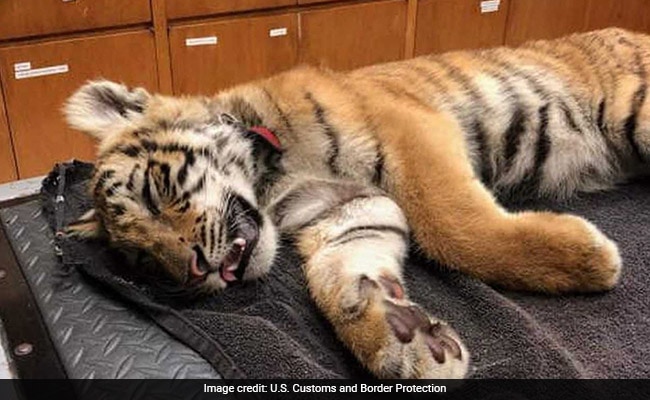Federal Agents Peered Into A Duffel Bag On The Mexico Border. They Found A Tiger Cub.

The three men crossed the U.S. southern border into Texas with a black duffel bag, on an apparent mission to deliver their lucrative product to the United States.
But they caught wind of border agents nearby, readying to intercept them near Brownsville, officials said.
It led to a calculation: Now what? And what to do with the unconscious tiger cub weighing down the duffel bag?
"NOT an average day in the field," Irma Chapa, a spokeswoman for the Rio Grande Valley sector of CBP, said in a tweet Monday.
Chapa said the tiger cub is "expected to make a full recovery," and CBS affiliate KHOU reported that the cub was taken to Brownsville's Gladys Porter Zoo. Luckily for the tiger, the zoo specializes in handling endangered species.
The cub was an apparent node in the billion-dollar trade of animal smuggling, and it is in unfortunate recent company: A tiger cub bought by an American teenager was intercepted at a checkpoint in California last summer.
In 2010, border agents recovered a caged and abandoned tiger in Laredo, another Texas border town.
About 350 million plants and animals are sold around the world annually, generating between $7 billion and $23 billion, Washington-based conservation group Defenders of Wildlife said in a 2015 report.
Latin America, one of the most biodiverse regions in the world, has emerged as a fulcrum in the endangered and exotic species trade feeding the booming U.S. market.
A quarter of the 50,000 animals and wildlife products seized at American ports of entry from 2005 to 2014 originated in Latin America, the group said. Smugglers move freely through corruption-rotted nations and exploit the sometimes porous border with Mexico to send endangered animals and illegal animal products into the United States.
Queen conch shells housing snails, prized by seafood chefs but subject to fishing bans in Florida, are the most commonly smuggled species from Latin America, the group found.
Sea turtles and iguanas are also trafficked in large numbers, with caiman and crocodiles smuggled and skinned for boot and belt leather.
"There's a demand for exotic skin boots, and the more exotic, the more people want them," Nicholas Chavez, the southwest region special agent for the U.S. Fish and Wildlife Service, told National Geographic last year.
And Mexican parrots are endangered by the demand for protected and rare birds, like the vividly colored orange-fronted and yellow-headed species.
Many smugglers rely on methods less conspicuous than black duffel bags carried by hand.
Last March, federal agents intercepted a shipment of Cobras hidden in potato chip cans.
(This story has not been edited by News Teles staff)
Source: https://www.ndtv.com/world-news/federal-agents-peered-into-a-duffel-bag-on-the-mexico-border-they-found-a-tiger-cub-1845749


No comments